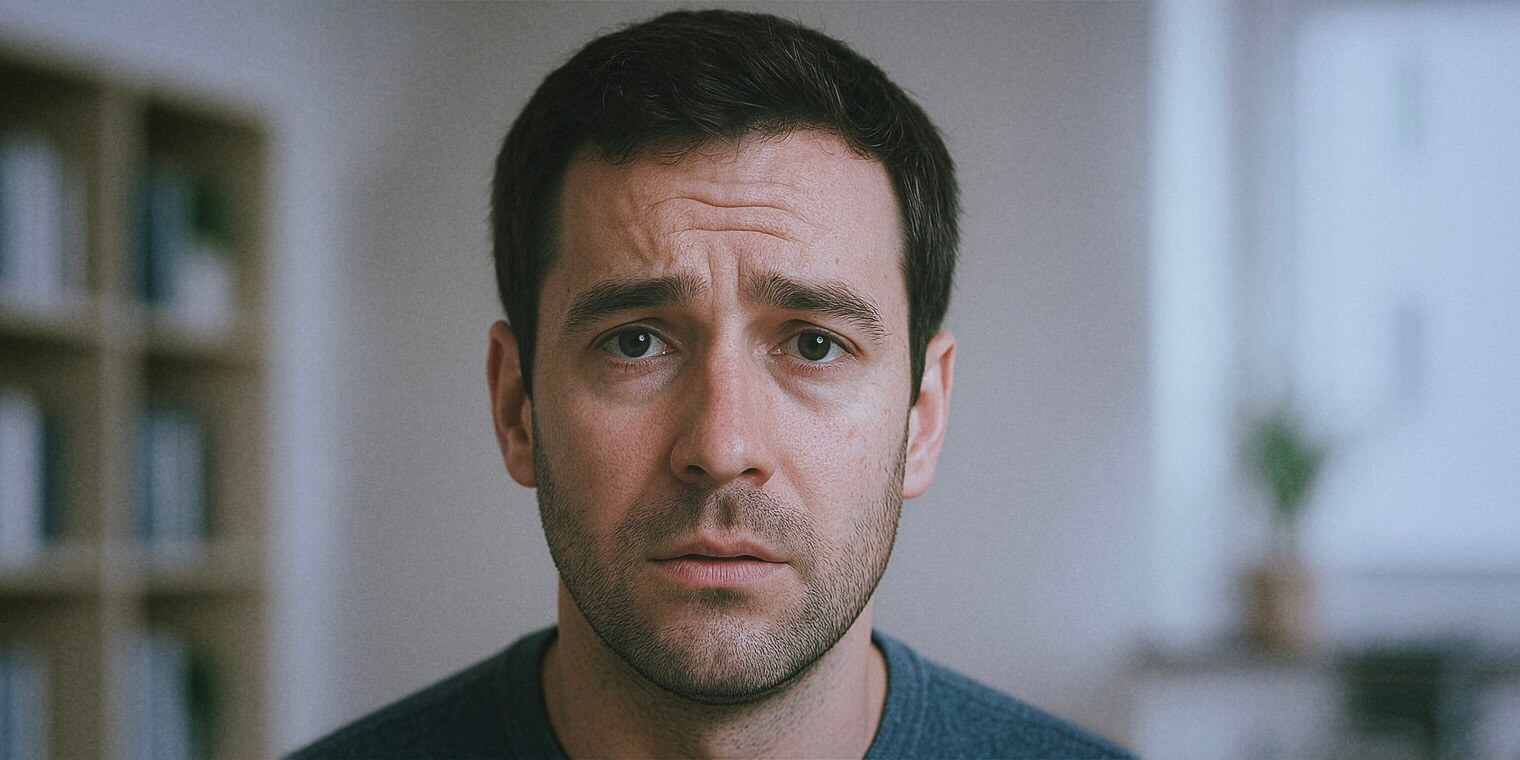There are a lot of well-known causes of chronic anxiety:
- Trauma
- Chronic health conditions
- Stress and Burnout
- etc.
But for most people with chronic anxiety, these obvious factors aren’t what’s keeping them anxious.
Today I’m going to share 4 of the most common subtle causes of chronic anxiety, plus some practical suggestions for how to address each one so that you can break out of the anxiety cycle and get back to feeling good.
1. Poor Boundaries with Other People
I think just about everyone knows that stress doesn’t help anxiety. In fact, chronic stress is one of those pretty obvious, straightforward causes of chronic anxiety that I mentioned earlier.
But where does chronic stress come from?
Turns out one of the biggest but sneakiest causes of chronic stress—and a root cause of chronic anxiety—is poor boundaries with other people.
Think about it:
- If you’re unwilling to sometimes say no to your partner’s request to play golf with his buddies each weekend, how are you going to make time for self-care and relaxation, which are essential for preventing stress and anxiety from forming in the first place?
- If you’re too nervous or embarrassed to say no to extra work from your manager or boss, you’ll quickly get overwhelmed by work and all the worries and anxiety that come from an overwhelming workload.
- If you habitually give in to requests from family members to participate in all sorts of extra activities during the holidays, is it any surprise that you’re habitually stressed and anxious during the holidays?
Big picture, here’s the dilemma:
Avoiding boundaries gives you short-term relief but it comes at the expense of long-term stress and anxiety.
So if you want to lower your overall levels of stress and anxiety, one way or another, you have to be willing to set and enforce healthy boundaries with other people in your life.
Of course, boundary setting is a big topic with lots of moving pieces. But here’s a small but powerful tip to help you get started:
Look for the yes behind the no.
We don’t set boundaries simply to be difficult. We set them for a greater purpose…
- You say no to extra work so you can be present with your family.
- You say no to your husband’s golf tournament so you can say yes to self-care.
But if you don’t remind yourself of those yeses behind your nos, it’s very easy to end up devaluing your boundaries and then not setting them in the first place.
So, at each point in the boundary setting process—before, during, and after—make a point to remind yourself of the bigger value or purpose behind your boundaries and you’ll find you have much more courage and motivation to follow through on them.
2. Poor Boundaries with Yourself
It’s sound a bit strange at first blush, but there are different parts of your self, and having good boundaries with them is at least as important for your overall anxiety as having boundaries with other people in your life.
So what are these parts of our self that we need to have better boundaries with?
Here are a few common examples:
- The Worrier. Your partner is leaving on a long business trip. Your brain throws a worry at you along the lines of: “What if she gets mugged on the streets of New York City?” But instead of setting a boundary with such an unproductive and anxiety-producing thought, you instead get into a conversation with it and start elaborating on this initial worry with even more worries. In no time, you’re overwhelmed by anxiety.
- The Inner Critic. As you lie in bed at night, a memory pops up of a big and very embarrassing mistake you made at work several years ago. Your self-talk immediately defaults to criticizing yourself for making such a stupid mistake. But instead of setting boundaries on that inner critic, you start ruminating on the mistake and trying to understand how you could have been so “stupid.” And now, because you’ve given so much attention to this memory and your inner critic, both are more likely to show up again in the future, making you increasingly anxious about sleep at night. And because you’re anxious about sleep, you don’t sleep as well, which makes you far more vulnerable to anxiety throughout the day.
- The Procrastinator. You set a goal to finish up a report today. But as you sit down to get started, a voice suggests that you just aren’t motivated enough right now for such an intense task. Better to get through some email first. And because you give into this part of you instead of setting a boundary, one thing leads to another and by the end of the day you still haven’t gotten to the report. Now you’re worried about having to finish it over the weekend. Which makes you worried about how upset your spouse will be for not being able to spend enough quality time with the family. You continue to feel anxious and guilty all weekend—which drives a lot of anxiety—and don’t manage to finish it until late Sunday evening, interrupting your sleep and leaving you exhausted and anxious to start off the week.
We almost never notice it, but the inability to set boundaries with ourselves is one of if not the greatest causes of chronic anxiety in our lives.
If you resonate with this, here’s a simple little mantra to help you set better boundaries with your own mind:
Just because my mind talks doesn’t mean I have to talk back.
Some of us are so used to overthinking that we don’t even realize 95% of our self-talk is a choice. And with a little self-reflection, we can choose not to engage in anxiety-producing self-talk.
3. Not Asking for What You Really Want
In some ways, this is the flip side of the first point:
Just like avoiding boundaries can lead to a lot of excess stress and anxiety, so too can inhibiting your desire to ask for what you want or express how you really feel.
For example:
- Suppose you’re in a meeting at work.
- You have a good idea you want to share with the team, but you start second-guessing yourself because you’re worried that people might think it’s dumb or even lead to an argument.
- To avoid this potential embarrassment or conflict, you decided to hold back and not share your idea.
- You immediately feel a sense of relief because you dodged any potential issues.
- But—and this is the crucial question—what have you taught your brain?
- By sacrificing your good idea for temporary relief, you’ve taught your brain that what other people think is more important than what you think.
- Do this regularly, and you start to lose trust in yourself and develop a lot of self-doubt and your confidence sinks—both of which make you much more prone to worry and anxiety.
Going with the flow and not speaking up seems harmless enough in the moment. In fact, it’s often easy to rationalize as “the right thing to do” because it seems to keep everybody happy.
But long-term, you’re killing your confidence and self-esteem—and making yourself much more prone to anxiety—all in exchange for a little momentary relief.
The solution is to be willing to ask for what you want and express yourself assertively, which means in a way that is completely respectful of others but also—crucially—of yourself and your wants and needs.
Now, being more assertive is a big topic. So for now I think the most important next step is to simply reflect on where in your life you are most likely to inhibit your authentic wants and needs. And to ask yourself honestly: What are the costs of this pattern? What am I giving up by not asking for what I really want?
These are difficult questions, but they’re essential if you want to build the confidence and resilience that comes from expressing yourself assertively.
And if you’re ready to start communicating more assertively, I have a free resource called The Assertive Communication Cheat Sheet where I share my favorite tips and resources both for being more confident expressing yourself and for setting better boundaries.
4. Lack of Adventure
Let’s talk about stress for a second…
Most people think of stress as a bad thing, which makes sense because there are many negative effects that come from stress.
But technically, there are two types of stress, only one of which is bad:
- Chronic stress is the unhealthy kind that can make you more vulnerable to everything from anxiety and depression to immune dysfunction and heart disease.
- Good stress, however, is a vital part of our mental and physical health that allows us to heal from injury, overcome challenges, and even grow emotionally. A simple example might be when I notice my toddler chasing one of his balls into a busy street and my fight or flight response immediately kicks into gear, flooding my system with stress hormones that allow me to quickly chase after him and stop him from getting hurt. Another example would be feeling sore after lifting weights: By lifting heavy weights I have deliberately stressed my muscles, leading to a stress response, which while uncomfortable in the moment, actually leads to stronger muscles later.
The bigger point here is that while bad stress makes us vulnerable to anxiety, good stress makes us resilient to it.
In fact, many of the examples in the previous tips involve welcoming temporary good stress in order to grow more confident and resilient, and as a result, be less anxious long-term—sharing an idea at a meeting even though someone might not like it, saying no to your family’s request to host a holiday party even though they might get annoyed at you, etc.
The implication of all this is….
One of the best ways to lower chronic anxiety and build confidence is to deliberately seek out sources of good stress—the kind that helps us grow and become stronger.
So, just like the heroes of your favorite stories are willing to leave the safety and comfort of their homes to seek out adventure, you too can seek out adventure—not because you want to rescue a princess or slay a dragon, but because it’s growth-promoting.
And while adventures could be big and epic in scale—changing careers, moving across the country, writing a novel—they can also be more ordinary.
Here are a few ordinary adventures that can build confidence and reduce anxiety:
- Take up a new hobby like knitting or hiking.
- Start a book club.
- Write a letter to the editor of your local newspaper about an issue you care about.
- Sign up to run a 5K.
- Volunteer for a political cause you’re passionate about.
- Try that new Ethiopian restaurant that opened up down the street.
- Ask that cute guy from the office out on a date.
If you struggle with chronic anxiety, the very understandable tendency is to shrink and do less in order to stay safe.
But ultimately, we only remove anxiety by building confidence. And to do that, we have to be willing to go adventuring.
Luckily, life is full of opportunities for adventure, both big and small.
Next Steps
If you enjoyed this article, here are a few more you might like:




